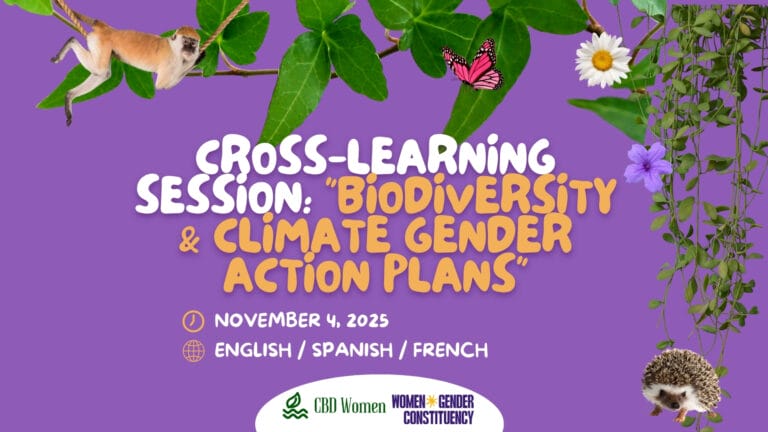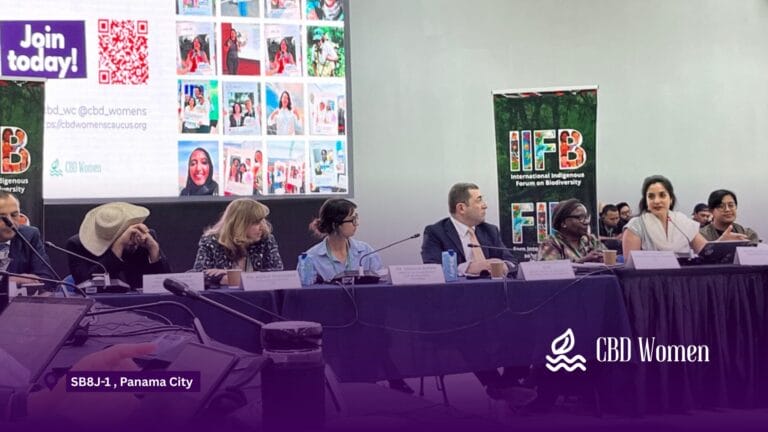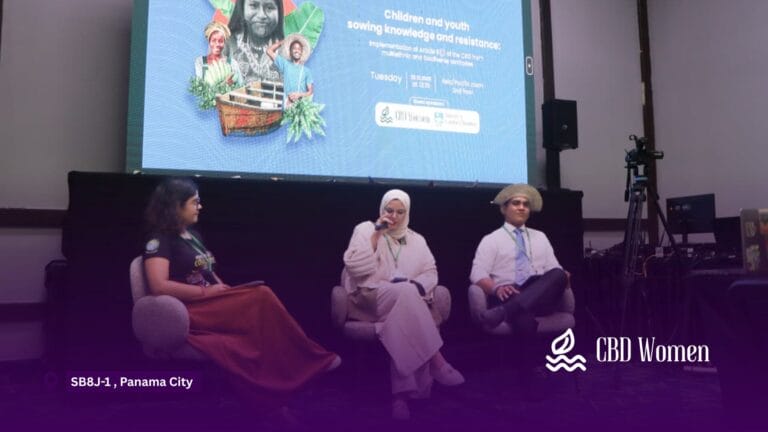By Soledad Torres, Biodiversity and climate change specialist and CBD Women’s caucus member
Can we truly speak of climate resilience without addressing justice? At a recent global workshop, the answer rang out loud and clear: absolutely not.
A diverse group of experts gathered in Cambridge, UK, for a hybrid workshop organized by the CBD Secretariat to develop a supplement to the Voluntary Guidelines for the Design and Effective Implementation of Ecosystem-based Approaches (EbA) to Climate Change Adaptation and Disaster Risk Reduction. Participants included representatives from Parties, CBD constituencies, such as the CBD Women’s Caucus, and key organizations.
The consultation process led by the CBD Secretariat included an online consultation on 19 March 2025 and a hybrid workshop held in Cambridge, UK, from 7 to 9 May. This series of events was convened to collect inputs on the new technical supplement’s structure and content, and to facilitate substantive contributions from the stakeholders. Together, these spaces created opportunities for participants to shape the content and structure of the upcoming technical supplement.
The CBD Women’s Caucus was represented by Ms. Soledad Espinola Torres, from Paraguay, a practitioner in biodiversity conservation, policy advocacy, and community engagement with experience working with women and youth.
The diversity of perspectives shared throughout the process enriched the draft, reinforcing its value in tackling biodiversity and climate challenges through inclusive, rights-based, and gender-responsive approaches.
During such an event, Ms. Espinola Torres reaffirmed the CBD Women’s Caucus’s commitment to the full and effective implementation of the Gender Plan of Action (GPA) and Target 23 of the Global Biodiversity Framework. It emphasized advocating for gender justice and the leadership and rights of women and girls, recognizing them as vital contributors to biodiversity conservation policy and action. The event also highlighted the urgent need to unite people and nature so they can mutually support long-term resilience.

Event Highlights and Activities
The workshop addressed priority themes as:
- Nature-based Solutions (NbS) and EbA to climate change mitigation, adaptation, and Disaster risk reduction (Eco-DRR) to support the implementation of Targets 8 and 11, as well as other related targets of the Kunming-Montreal Global Biodiversity Framework (KMGBF).
- Case studies that demonstrate good practice in the design, implementation, and scaling of nature-based solutions and/or ecosystem-based approaches, including Mother Earth-centric actions, and rights-based and gender-responsive approaches.
- Ensure implementation of the Kunmining Montreal global biodiversity Framework follows a human rights-based approach, respecting, protecting, promoting, and fulfilling human rights, including the rights of Indigenous Peoples and local communities, and implementing effective social and environmental safeguards.
- Key messages and recommendations for policymakers and practitioners.
Outcomes and Next Steps
The workshop concluded on February 20, 2025, after countries from Central, Eastern, and Southern Africa discussed tools, solutions, and challenges to achieving Target 3 of the Kunming-Montreal Global Biodiversity Framework. Key outcomes from the event included:
- A commitment from participating countries to strengthen policies that support Indigenous people and local communities (IPLCs) and Other Effective Area-Based Conservation Measures (OECMs) and integrate a gender-responsive approach into biodiversity policies and strategies.
- Development of partnerships among governments, NGOs, and Indigenous people and local communities (IPLCs) to foster inclusive approaches to conservation.
- Emphasis on the importance of transparent governance and equitable benefit-sharing mechanisms to ensure that conservation efforts are both effective and fair.
The CBD Women’s Caucus continues to champion gender justice in biodiversity governance and will follow up on the action points discussed at the workshop. Readers are encouraged to stay connected with the Caucus as they work to influence global biodiversity policies and ensure that women and girls alongside with the Indigenous people and local communities and youth have a seat at the table in future negotiations.
Towards Implementation: Outcomes and the Way Forward
One of the key points discussed was the need to develop a supplement focused on practitioners working in the field, who require specific messages and practitioner tools available to implement projects effectively. Ensuring that the participatory process is cross-cutting throughout the cycle was emphasized.
Another relevant aspect was to encourage community-led processes and the leadership of women and girls, recognizing their contributions as key users and stakeholders in biodiversity conservation and climate resilience.
It is essential to highlight case studies that reveal good practices and lessons learned from different global regions, reflecting the different settings, contexts, and social situations of communities supporting gender justice in climate action and disaster risk reduction.
The draft supplement will be made available to the Subsidiary Body on Scientific, Technical and Technological Advice (SBSTTA) at its twenty-seventh meeting. Therefore, this process will be closely followed by the CBD Women’s Caucus to ensure the effective integration of a gender and human rights approach along with appropriate safeguards.
Disclaimer: The views expressed in this blog are those of the author and do not necessarily reflect the official position or opinions of the CBD Women’s Caucus.




